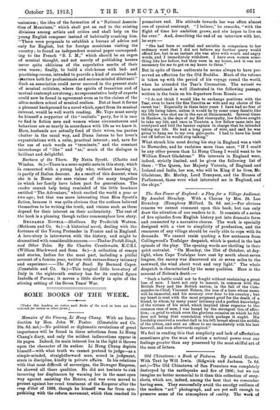The Sea-Power of England : a Play for a Village
Audience. By Amabel Strachey. With a Chorus by Mrs. St. Loe Strachey. (Humphrey Milford. 2s. 6d. net.)—For obvious reasons we cannot comment upon this book, but can only draw the attention of our readers to it. It consists of a series of five episodes from English history put into dramatic form and connected by a narrative chorus. The work is specially designed with a view to simplicity of production, and the resources of any village should be easily able to cope with its demands. We cannot resist quoting a few sentences from Collingwood's Trafalgar despatch, which is quoted in the last episode of the play. The opening words are thrilling in their quiet restraint. " On Monday, the 21st of October, at day- light, when Cape Trafalgar bore east by south about seven leagues, the enemy was discovered six or seven miles to the eastward, the wind about west and very light." The whole despatch is char•acter•ized by the same qualities. Here is the account of Nelson's death :—
" Such a battle could not be fought without sustaining a great loss of men. I have not only to lament, in common with the British Navy and the British nation, in the fall of the Com- mander-in-Chief, Viscount Nelson, the loss of a hero whose name will be immortal, and his memory ever dear to his country ; but my heart is rent with the most poignant grief for the death of a friend, to whom, by many years' intimacy and a perfect knowledge of the virtues of his mind, which inspired ideas superior to the common race of men, I was bound by the strongest ties of affec- tion; —a grief to which even the glorious occasion on which he fell does not bring that consolation which perhaps it ought. His Lordship received a musket-ball in his left breast about the middle of the action, and sent an officer to me immediately with his last farewell, and soon afterwards expired."
We feel in reading this that simplicity and lack of affectation sometimes give the man of action a natural power over our feelings greater than any possessed by the most skilful art of the man of fetters.














































 Previous page
Previous page